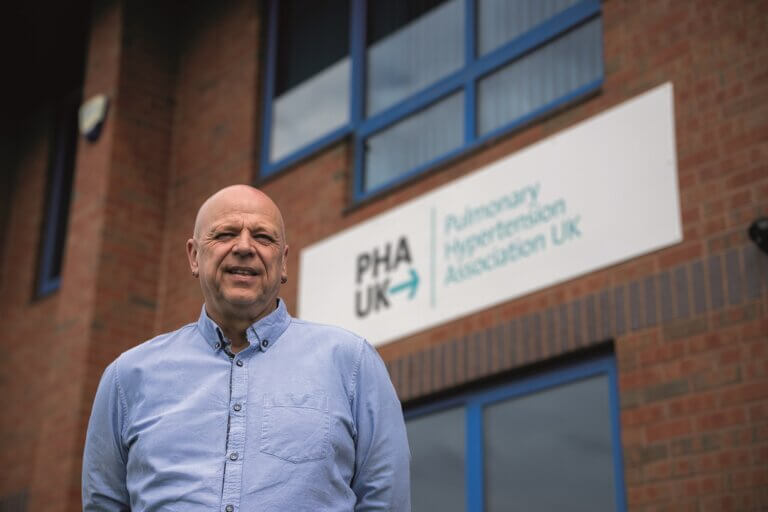"Together, we can face these challenges head-on and continue to support each other"

Dr Iain Armstrong, Chair of the PHA UK, has written this open letter in response to the NHS reforms that have been announced in recent weeks.
April 2025
I am writing to you as Chair of the PHA UK to let you know that I share the concerns that many of you have about the significant changes to the NHS - especially regarding rare diseases and their funding - and to reassure you that our organisation is working with others to stand up for what’s right.
On 13th March, the Prime Minister announced that NHS England will come to an end, and the Secretary of State for Health and Social Care, Wes Streeting, stated that NHS England will be "taken back into direct government control." This process is expected to take two years, and these developments are the reason for my letter today.
We are standing with over 200 organisations, including groups like Genetic Alliance UK and the Specialised Healthcare Alliance, to urgently highlight the critical implications of the proposed reintegration of NHS England into the Department of Health and Social Care (DHSC) for people affected by rare and difficult-to-diagnose conditions.
I have already attended two meetings at Westminster this year to better understand the situation and explore solutions. It is my intention that the PHA UK, working on behalf of our members, is heard loud and clear.
I am committed to ensuring that the needs of our community are prioritised and addressed during these challenging and changing times. And we would welcome the opportunity to work with the authorities and decision-makers during the transition period, to ensure that these reforms deliver the highest quality care for people who use health services.
Ensuring continued commissioning expertise: We need to make sure that the people who plan and organise specialised services continue to do so without interruption, even as NHS England changes.
Maintaining robust PH services: It's crucial to keep the UK’s specialised PH network in place, to guide and constantly improve PH services, especially during this transition. We must protect the systems that help us treat the disease (and understand them better through continued world-leading research). This must continue to advance without disruption.
Guaranteeing patient and public voice in decision-making: It's vital that patients' voices are heard and included in the decisions that affect their care, especially during these changes.
The specialised PH services in the UK are the envy of the world and this was very apparent at the World Symposium on PH held in Barcelona last year, which I attended. Here in the UK, we excel in sharing clinical expertise among the PH specialised centres, allowing for high-quality and often groundbreaking research to take place. It is this excellence that we need to both protect and strengthen during these potential changes to the NHS.
Rare diseases like PH simply must be given appropriate attention and consideration during this time of change, to ensure our specialist services can continue to make a difference.
There are also promising new PH drug therapies on the horizon, and here at the PHA UK we are working with the National Institute of Health and Care Excellence (NICE) to explore accessing these drugs in the UK. I do not want to see access to these therapies impeded by changes, and the powers that be ‘taking their eyes off the ball’.
The lived experiences of people with pulmonary hypertension must be the guiding principle for healthcare provisions. When the patient is truly at the centre everything we do, healthcare thrives. When it is not, healthcare falters.
Therefore, it’s crucial that as a PH community we come together like never before. Your experiences, voices, and needs are what drive us to advocate for the best possible care and support. We have always demonstrated that while patients with PH might well be breathless, they are definitely not voiceless.
In summary, whilst there are challenges ahead, I am committed to working hard on your behalf to ensure that your needs are met. Together, we can face these challenges head-on and continue to support each other.
Thank you for your continued engagement with the work of our charity.

Dr Iain Armstrong
Chair, PHA UK

Dr Iain Armstrong, Chair of the PHA UK, has written this open letter in response to the NHS reforms that have been announced in recent weeks.
14 April 2025
Travelling from Cambridge to Dublin is no short journey, but Conor Keeling is determined to complete it on just two wheels to say thank you for his PH care. Here, he explains why…
10 April 2025
Our new survey aims to understand the symptoms people with pulmonary hypertension struggle with most, so we can support them in the most effective ways.
2 April 2025
On 18th March, the government announced proposals to change parts of the benefits system, including Personal independence Payments (PIP), which many people with pulmonary hypertension rely on. We have put together this information to help you understand what has been proposed, what it means for people with long-term health conditions, and what happens next.
20 March 2025
Booking is now open for our next free Together event, this time held in conjunction with the Scottish Pulmonary Vascular Unit.
11 March 2025
Our new informal get-togethers are a chance to connect with others affected by PH in a welcoming and relaxed environment.
18 February 2025